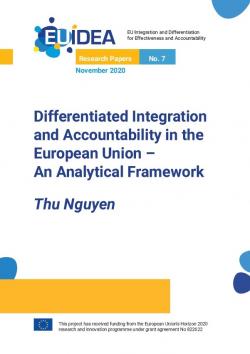Differentiated Integration and Accountability in the European Union – An Analytical Framework
Differentiation has become an established feature of European integration in the past decades, and a variety of forms of differentiated governance have been established either within the EU Treaties, by the EU Treaties or outside the EU legal framework. At the same time, differentiated integration poses particular questions about how to organise accountability in an EU in which different groups of member states participate in very different forms of integration. Bringing together the accountability and differentiation literature, the paper develops an analytical framework allowing for an indicator-based assessment of accountability mechanisms. By proposing an analytical framework with concrete indicators for the assessment of accountability in various differentiated integration formats, this paper closes a gap in the literature and opens new paths for the comparative analysis of accountability across various shades of European integration.
-
Details
Rome, IAI, November 2020, 23 p. -
In:
-
Issue
Research Paper 7
Introduction
1. A principal–agent perspective on differentiation and accountability
2. An accountability framework for differentiation
3. Applying the accountability framework
3.1 Internal differentiation: Eurozone
3.1.1 Who to hold accountable (who is the agent)?
3.1.2 Who is holding accountable (who is the principal)?
3.1.3 Are accountability mechanisms in place and do they link principal and agent?
3.1.4 Are there other forms of accountability in order to complement or compensate the accountability mechanisms above?
3.2 External differentiation: Schengen
3.2.1 Who to hold accountable (who is the agent)?
3.2.2 Who is holding accountable (who is the principal)?
3.2.3 Are accountability mechanisms in place and do they link principal and agent?
3.2.4 Are there other forms of accountability in order to complement or compensate for the accountability mechanisms above?
Conclusion
References



